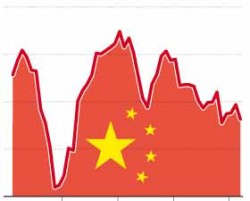China slowdown affecting Australia?
Posted on September 26, 2012 Australia has literally been moving (and selling) mountains to China. It has also attracted billions in investments. Chinese demand for Australian iron ore and coal has steered Australia through the Global Financial Crisis of 2008 and led to 21 years of consecutive growth in GDP. But, is it all about to end?
Australia has literally been moving (and selling) mountains to China. It has also attracted billions in investments. Chinese demand for Australian iron ore and coal has steered Australia through the Global Financial Crisis of 2008 and led to 21 years of consecutive growth in GDP. But, is it all about to end?
The slower boat in China
China is slowing and Australia is not immune. Weak demand from the USA and Europe has led to contractions in exports, imports and in domestic consumption in China. China’s economy also remains heavily geared to investment. The 4 trillion Yuan stimulus of 2008 is concluding which leaves Australian’s wondering whether the continued prosperity on the back of the minerals boom will continue. In recent comments Chinese leaders seems to indicate that although they still support the economy, but there won’t be a repeat of the vast 2008 stimulus.
Will there be a hard landing in China? No.
We don’t think so. The Chinese government still has all the levers it needs to stimulate the economy, should it choose. It has low debt, huge control over the banks to channel investment, a dependent central bank to control interest rates or print money to stabilize a bank.
Breaking the addiction
To their credit, the Chinese government however is trying to break their own boom, bust stimulation addiction, by gently applying the accelerator this time. That doesn’t mean it can’t, or won’t step on the accelerator if it is really necessary. Mass unemployment is still the main worry of the central government, so we have little fear that the slowdown will intensify. Still, at least for the moment, the government is seeking to keep the next hit small.
 So what does a slowdown mean for Australia?
So what does a slowdown mean for Australia?
With an already soft services sector, flat consumption and a high Australian Dollar a contraction in trade with China would hurt. It would hurt investment, trade flows and profits and budgets. It would also hurt the Australian dollar immediately. The trigger would be a continued fall in interest rates and a cancellation of investment projects, which seems to have already commenced in a small way.
Australia: 25% Iron Man
Clear evidence of the slowdown is shown in the iron ore spot price. In August 2008 iron ore was at a record $180 USD per tonne and now it is sitting at $100 USD per tonne. Iron ore accounted for 25% of Australia’s exports for period ended May 2012.
The Australian equity market has already priced a slowdown in China but we think the currency markets have not. The Australian dollar sitting at around 1.05 to a USD is not sustainable.
Banks, not holes
Miners such as BHP, RIO Tinto and Fortesque are already bearing the brunt of poor investor confidence. Fortesque is already down 35% since the start of the new financial year on the falling iron ore price. This doesn’t mean the mining companies are cheap. Banks however don’t look expensive with reasonable dividend yields in the 5-8% range and a stronger balance sheet than almost any other developed country. It is said that Australia’s largest four banks have a market capitalization of all continental European banks. Strong risk management (Australia had its property bust in the early 90s) and an active regulator have played an understated role in keeping Australia safe the last 21 years.
The Savings Reversal
The financial crisis also helped. Heading into 2008 Australia’s were continuing to load up on debt to bet on property investments. Then the crisis caused a re-think and, amazingly, households changed their approach. They stopped borrowing, since debt had reached about 160% of annual income and started saving again. They started paying back loans. This is why Australian retailers have been complaining.
The near miss
Saving has only just recently fallen from 10% of GDP, a figure that used to be associated with deep recession, so household balance sheets are now far stronger than even 4 years ago. It is said that at least 70% of Australians are ahead on their mortgage repayments. It was like Australia, about to go on a nasty weekend property borrowing bender, got a glance at the American property market already lying like a drunk passed out in the gutter and thought “I’d better head home. Don’t want to end up like that”.
Property: Strong at bottom
The Australian property market has been pretty soft last couple of years, but hasn’t had a collapse like America or Spain. It isn’t likely to either. From our research, there remains an undersupply of entry level properties in decent locations. Entry level price range of $350-550,000 has continued to have robust sales figures. That said, we don’t think at these prices the Australian market represents a bargain either compared to other markets, particularly the US or Germany.
Not that Premium, anymore.
Premium which (apart from Sydney) is in the 800,000 to 1.5 million range has been very soft with falling prices in most markets, (again, apart from Sydney). If you are in the market for a premium home, now is the time to look. We have heard of good 15-30% discounts in some areas for motivated sellers. There is also a negative correlation between property prices and the Australian dollar in many areas. When the Australian dollar falls many expatratriates look to buy in for a preparation to return home.
Triple A will stay – but it might not be enough
Australian government bonds have been a safe haven asset for the past decade and look set to continue in that fashion, although there are important caveats. Current yields on a 10-year bond are hovering at 3%. Although Australia will continue to hold a triple A credit rating, and offers a higher yield compared US treasuries there are risks.
Not as safe as a bank
If the Australian dollar weakens for a prolonged period we are likely to see domestic inflation spiking up again. This would mean higher interest rates (or fears of them) which would push down bond prices. This would mean losses for bond or bond fund investors – it always happens when interest rates rise. A safer choice might just be a high interest bank account rather than the bond market for most Australians.
Dollar Rollercoaster
Lastly, the Australian Dollar has been sitting comfortably above parity for the majority of the year but it remains the most volatile major currency bar none. The high dollar has reduced inflation by making international goods cheap. Chinese concerns threaten to push the AUD back below parity, thus making the Australian dollar a pretty risky investment just a present. In fact unless there is an urgent reason to do so, it is probably worthwhile to wait.
Air Bag for a dollar
The advantage of having a very open economy with a freely floating exchange rate is that change is adjusted for quickly. The Australian dollar fell heavily (by around 40%) during the financial crisis helping exporters at a key time. During the boom the high Australian dollar played a strong role in slowing things down. The dollar is like a counter-weight; keeping the economy from overbalancing one way or another.
Cuts both ways
Australia and China have a close relationship, at least in trade and investment. A slowdown is unlikely to change that. As the saying used to go, when the elephant sneezes, the smaller animals catch the flu. That however misses the more complex reality that Australia is well placed to weather this slowdoan. Australia will be affected, by any slowdown, but it is also worth pointing out that none of this may occur. In the end, the Chinese government may end up with another big stimulus if the gentle approach doesn’t work. Better that than unemployment and an unhappy population, don’t you think?
About Caterer Goodman Partners
Caterer Goodman Partners is a Shanghai based wealth management firm established with a clear vision to provide a new level of personalized financial planning services for expatriates in Asia. Our financial advisors provide guidance for our clients in all areas of investment, specialising in managed accounts, money-market funds, retirement planning and alternative investments. At Caterer Goodman Partners, we offer our advice and experience to provide low cost, tax-effective and simple solutions to match our clients’ interests.
About Owen Caterer
Since graduation Mr Owen Caterer has worked with the Queensland Premier's Department in Trade Facilitation and then as a financial adviser in Shanghai from 2005 until 2010. He then rose to Senior Adviser, then Business Development manager and then to Chief Investment Officer responsible for portfolios to a value of US$280 million across Asia. Following that Mr Caterer left to found his own firm with a partner in the financial advisory and wealth management area. This focused on developing China and Asia's first fee-based financial advisory (rather than commission-based). This has grown to now have 8 staff and and managing almost US$35 million for clients throughout Asia. This business success was recognized as a finalist in the 2013 ACBA in the Start Up Enterprises category and are one of a small number of foreign managed firms to have a full asset management license in China. Owen has also been active in the community volunteering for the Australian Chamber of Commerce in Shanghai and acting as the Vice-Chair of the Small Business Working Group (2012-2014) and as the Co-Deputy Chair of the Financial Services since 2013 until the present. They have continued to grow their business and have now been selected as a small group of companies who are platinum members of the Australian chamber of commerce. The achievement they are most proud of is their efforts to reform the financial planning industry in China and push it away from a hard-sales commission driven model to a more ethical management fee and long term customer service model. Owen has a Graduate Diploma of Applied Finance from the Securities Institute of Australia of which he was a member as a Fellow of Finance for many years and also has an undergraduate degree from Griffith University in International Business. Owen's interests are tennis, running and his wife and two children. He speaks fluent Chinese, first arriving in China in 1997.
Tags: Australia, Caterer Goodman, China, Economy, Expat, Investment, mining, Owen, Owen Caterer, slowdown
Categorised in: Emerging Markets, Global Markets, Investments, Market Flash

